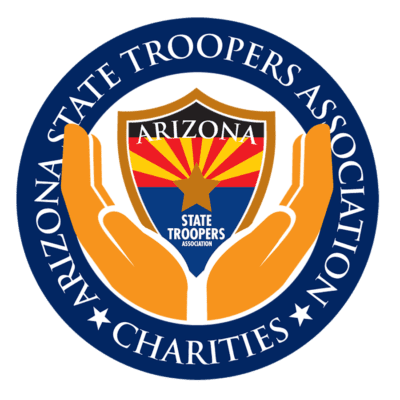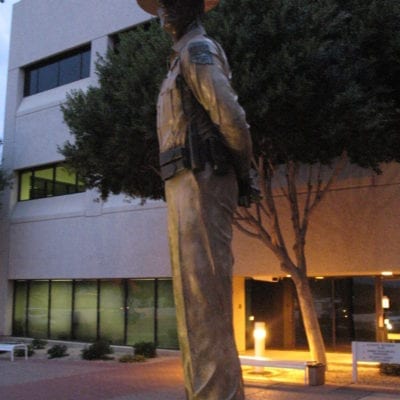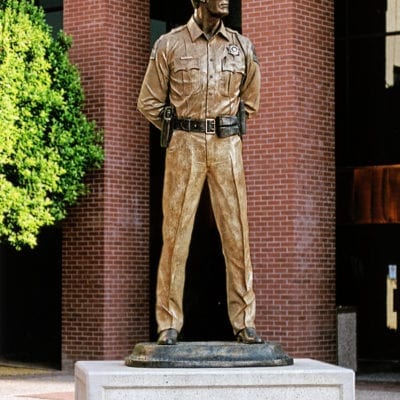
- New study: Sleep loss impairs critical police-type decision-making
II. Civilians eager to learn the street perspective on police use of force
III. More on building community rapport: Our readers write…
IV. A think tank author on “demonization of law enforcement” - New study: Sleep loss impairs critical police-type decision-making
In “fast-paced situations with uncertain outcomes and imperfect information,” good decision-making is “significantly hampered” by sleep deprivation, according to a new study by researchers from Washington State University and the University of Melbourne, Australia.
Police officers, soldiers, disaster management personnel, and other emergency responders whose lives–and the lives of others–may depend on their ability to quickly recognize and adapt to changing circumstances may suffer “catastrophic effects” because sleep loss blunts their reaction to feedback regarding the situation they’re in, the researchers report.
“Although this theoretical study examines rather extreme sleep deprivation, the findings send an important cautionary message to law enforcement,” says Dr. Bill Lewinski, executive director of the Force Science Institute. “This study adds important weight to the evidence that fatigue can have a profound effect on an officer’s performance and needs to be addressed on both a departmental and personal level.” (The Institute was not involved in the new experiments.)
SLEEPLESS IN SPOKANE. At WSU’s Sleep and Performance Research Center in Spokane, WA, researchers led by Dr. Paul Whitney, a psychology professor and associate dean, randomly divided 26 healthy, drug-free volunteers, 22 to 40 years old, into two groups.
Both groups initially spent two restful days and nights in the laboratory, with 10 hours in bed each night. Then one group was kept continuously awake for 62 hours (2 1/2 days), followed by two “recovery” days with 10 hours in bed each day. The control subjects continued their normal sleep pattern throughout this period.
At 48-hour intervals, all participants were subjected to various “decision tasks” to measure their cognitive capability.
SUDDEN SWITCH. The core testing component involved “go/no go” decision-making. A series of two-digit numbers was repeatedly flashed before the participants for three-quarters of a second each in random sequence. Four of the numbers represented “go” or “hit” signals, another four “no go” or “false alarms.” But the volunteers were not told which were which. They had to figure this out through trial and error. Their “accuracy feedback” was coupled with fictitious money rewards and losses to underscore that risks underlay their decisions.
After each volunteer had several dozen trials to learn the go/no go sets, the meaning of the numbers was reversed without warning or announcement. The subjects then had 40 trials to determine and master the new “response sets,” based on outcome feedback from their decisions.
This experiment, conducted on three occasions with different numbers, “captured three key elements of decisions” made in real-world circumstances, Whitney writes. The choices were forced “under time pressure; [the] choices produced good or bad outcomes; and feedback from outcomes [had to] be used to guide future choices.”
Diminished ability to use feedback to shape decisions became “especially prominent” when the sudden, unpredictable need for “reversal learning” was introduced, the researchers discovered.
“STRIKING DIFFERENCES.” Before sleep deprivation was imposed on the one group and “all subjects were well rested,” both groups “performed equivalently,” the researchers report. They were gradually able to determine the initial go/no go pattern and with reasonable practice overcome the “immediate and substantial disruption” of the sudden reversal.
After sleep deprivation kicked in, however, “striking differences in performance emerged,” the study found.
Even before the reversal point, the sleepless volunteers were “less effective” at figuring out the proper response pattern. After the reversal, their decision-making failed alarmingly.
While the rested group detected the new pattern within eight to 16 tries and “quickly returned to its previous high level of performance,” the sleep-deprived subjects “showed a profound inability to differentiate” the new numerical associations, even across 40 trials. Indeed, their average score of proper responses was “reduced to near zero” after the change of circumstances and showed no improvement going forward.
Even after recovery sleep, “significant differences” persisted with the sleep-deprived group, reflecting marked “decreases in hits and increases in false alarms” compared to the control group. Separate tests of concentration (“sustained attention”) also revealed notable deficits among the sleep-deprived, the researchers report.
Sleep loss appears “particularly problematic for decision making involving uncertainty and unexpected change,” the researchers conclude, with “blunted reactions to feedback” seeming to underlie the failure to adapt to “changing contingencies.”
REST-MANAGEMENT CHALLENGE. “The results reveal that no matter how hard a sleep-deprived person tried to make the right decision, sleeplessness created short-circuits in the brain that prevented them from making the right choice,” Psychology Today reported.
Lewinski told Force Science News: “There’s a failure in processing information and subsequently formulating judgment that appears to come with fatigue. You just can’t get your brain to think about things correctly.”
Whitney’s team is convinced that something more than a compromised ability to focus attention is involved. But the researchers are not certain what that mystery factor might be.
Still, “our findings tell us that putting sleep-deprived people in perilous environments is an inherently risky business,” says Dr. Hans Van Dongen, director of the sleep center and a member of the research team.
The study does not reveal at what point sleep deprivation begins to affect decision-making. But Lewinski points out that other research has shown that being awake even for 18-20 hours can produce cognitive impairment equivalent to a DUI-threshold level of intoxication.
“In a threatening situation outside of a laboratory, you may get an adrenalin jolt that will temporarily off-set fatigue and facilitate better performance,” Lewinski says. “But that surge lasts only a very short period of time, you have to be aware of the threat for the adrenalin even to be released, and it never brings you to the same cognitive state where you’d be if you were fully rested.
“Fatigue is a critical issue for the safety of officers and those they are sworn to protect. Departments need to be conscious of fatigue in scheduling shifts, and officers need to be mindful as well in accepting overtime and planning their off-duty hours.”
The 12-page Washington study, titled “Feedback Blunting: Total Sleep Deprivation Impairs Decision Making that Requires Updating Based on Feedback,” appears in the journal Sleep. It can be accessed free of charge by CLICKING HERE.
Our thanks to Force Science Certification Course graduate Robert Bragg Jr., manager of fitness, force, and firearms training for the Washington State Criminal Justice Training Commission, for alerting us to this research.
- Civilians eager to learn the street perspective on police use of force
Amidst the angry chants of protesters hostile toward police–seemingly a newscast staple these days–it’s refreshing to find examples of departments making way in building rapport with the citizens they serve.
In Force Science News #275 [2/11/15], we reported the effort by the Redding (CA) PD to explain the realities of physical and deadly force to a local civil rights group. The program, spearheaded by Sgt. Casey Bokavich, included an evening’s immersion in fundamental case law, the dynamics of human performance under stress, an analysis of dash-cam videos, and simulator exercises.
Since then, the program has spread with increasing momentum. Bokavich reports:
“Recently, I gave the class to our local Interfaith Forum, a cross-section of all faiths in town and our most diverse group to date. A great experience! At the last minute, a local reporter showed up. I told her she could sit in if she stayed for the whole class, which she did. Her eyes were really opened to just how hard this whole topic is to work with and she wrote a very fair article.
“We have provided the class to all our city department heads and the city manager, as well as all city council members and our grand jury. We have even had neighboring city managers and council members attend. Requests are really starting to come in as the word spreads.
“We’ve received many inquiries from across the country as a result of the Force Science article, as many departments are trying to move forward with such a program. One detective from Maine has decided to use our concept as part of his master’s thesis.
“We continue to experience ZERO negative experiences by providing this class. The key appears to be that we are honest and upfront with the information. This is just a sample of the positive feedback:
“From a member of the Baha’i faith: ‘The force training deepened my understanding and appreciation of our law enforcement. This course must be made available to the general public. Further, if provided in schools, it may reap substantial crime prevention benefits.’
“From the member of a local synagogue: ‘I was featured the next day in my Neighborhood Watch email, so all my neighbors got to see me in the classroom. The information that a policeman could get killed in a simple traffic stop was enlightening.’
“From the Forum’s chair, a marriage and family therapist: ‘The videos of real-life incidents were striking, however the experience on the simulator was transformative. Even though I knew it was a simulator it was intense. I found myself solely focused on the threat of the gun, my body responding and my mind racing. Powerful!’
“We’re making a concerted effort to get to people who can communicate accurate information out, should we encounter a controversial use of force here,” Bokavich explains. “We want to be as proactive as possible.” For more information, Sgt. Bokavich can be reached at: cbokavich@reddingpolice.org
III. More on building community rapport: Our readers write…
Among responses to the report in our last edition on the campaign by Kalamazoo (MI) DPS to build public trust through exceptional acts of service:
Skepticism about Kalamazoo’s “new” initiative
Capt. Jim Mallery appears to have fallen victim to the same flawed logic I’ve seen time and again with administrators, across 23 years on patrol.
You report that his “informal polling” indicated that “officers rarely spent more than half their 12-hour shifts in enforcement activities.” Unassigned time does not equal idle time for a patrol officer. That is the necessary time to PATROL–to check on your businesses, neighborhoods, parking lots, look for suspicious persons, create that presence in your problem apartment complexes to suppress crime, etc. All of these are forms of enforcement activity.
The police behavior being promoted by Kalamazoo’s “program” is nothing more than what good police officers have always done. How about if we just encourage all officers to do more of this instead of labeling it as some new wheel-shaped invention?
Sgt. William Wilson
Las Vegas (NV) Metropolitan PD
The power of respect
Thanks for the positive examples from Kalamazoo. Before retirement, I split my career between working the streets, some full-time and some part-time, with working inside Ohio’s prisons. Respect is every bit as powerful as these examples show. Toughness can get you into places, respect can keep you there long enough to accomplish what needs to be done.
Tom Rees, Midwest Region Trustee
Concerns of Police Survivors
Circleville, OH
Performance feedback a valuable tool
Eliciting feedback from the public on officer performance helps keep employees on the right path and also helps make those police-community connections. What Kalamazoo is doing aligns with what we will be doing, and it’s cool to hear how well it works.
Det. Ken Gallop
Sparks (NV) PD
[Have a comment, question, insight to share? E-mail the Force Science News editorial staff at: editor@forcescience.org]
- A think tank author on “demonization of law enforcement”
Heather Mac Donald, a professional author and Fellow at the Manhattan Institute for Policy Research, writing recently in the Wall Street Journal:
“[T]he strongest predictor of whether a police officer uses force is whether a suspect resists arrest, not the suspect’s race. Contrary to the claims of the ‘black lives matter’ movement, no government policy in the past quarter century has done more for urban reclamation than proactive policing.
“Data-driven enforcement, in conjunction with stricter penalties for criminals and ‘broken windows’ policing, has saved thousands of black lives, brought lawful commerce and jobs to once drug-infested neighborhoods, and allowed millions to go about their daily lives without fear.
“To be sure, police officers need to treat everyone they encounter with courtesy and respect. Any fatal police shooting of an innocent person is a horrifying tragedy that police training must work incessantly to prevent. But unless the demonization of law enforcement ends, the liberating gains in urban safety over the past 20 years will be lost.”





